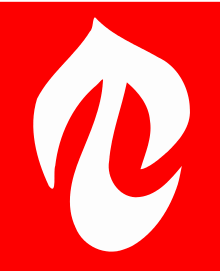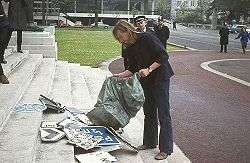Welsh Language Society
The Welsh Language Society (Welsh: Cymdeithas yr Iaith Gymraeg, often abbreviated to Cymdeithas yr Iaith or just Cymdeithas) is a direct action pressure group in Wales campaigning for the right of Welsh people to use the Welsh language in every aspect of their lives. The current Chairperson of Cymdeithas yr Iaith Gymraeg is Osian Rhys.

History and background
.jpg)
The Society was established in name on 4 August 1962 at Pontarddulais in South Wales, but did not have a constitution until 18 May 1963. The formation was at least partly inspired by the annual BBC Wales Radio Lecture given on 13 February 1962 by Saunders Lewis and entitled Tynged yr iaith (The fate of the language).[1]
The Society's first public protest took place in February 1963 in Aberystwyth town centre where members pasted posters on the post office in an attempt to be arrested and go to trial.[2] When it became apparent that they would not be arrested for the posters, they then moved to Pont Trefechan in Aberystwyth, where around seventy members and supporters held a 'sit-in' blocking road traffic for half an hour.[3]
The first campaigns were for official status for the language, with a call for Welsh-language tax returns, schools, electoral forms, post office signs, birth certificates and so on. This was done through the formation of 'cells', the first operating in Bangor in April 1963 by Owain Owain who also founded and edited the Society's only publication, Tafod y Ddraig ('The Dragon's Tongue') and designed the logo.

Cymdeithas yr Iaith believes in direct action, and in the course of its campaigns over a thousand people have appeared before the courts for their part in various campaigns, many receiving prison sentences, making it Britain's largest protest group since the suffragettes – in terms of fines and the numbers sent to prison.[4][5] Typical actions include painting slogans on buildings owned by businesses, and other minor criminal damage.[6][7][8] At the beginning of the 1970s Cymdeithas began to campaign for a Welsh-language radio and television service. Radio Cymru was established in 1977, but in 1979 the Conservative government under Margaret Thatcher announced that it would not keep its election promise to establish a separate Welsh-language television channel. Some protesters refused to buy television licences and others climbed up television masts and invaded television studios.[9] The government reversed its position and a Welsh-language TV channel S4C was launched in 1982.
On 24 July 2004 (five weeks after launching), Radio Carmarthenshire's studios in Narberth were invaded by eleven activists from the Welsh Language Society Cymdeithas yr Iaith Gymraeg. They were protesting against Radio Carmarthenshire's decision to limit the amount of its Welsh-language programming. The offices and studios were stormed during a live broadcast, taking Radio Carmarthenshire and Pembrokeshire off-air for fifteen minutes. According to Keri Jones (who later branded the members of the group as "terrorists"), his head of sales was injured, and needed hospital treatment for a fractured wrist sustained during the scuffles which ensued. Police arrested eleven activists, and subsequently released them pending further enquiries. The chair of the movement Steffan Cravos was later found not guilty of causing grievous bodily harm.[10]
Cymdeithas claimed that 50% of the population in Carmarthenshire speak Welsh as a first language, but less than 5% of Radio Carmarthenshire's output was in Welsh. As a result of complaints and pressure from the society and individuals, the United Kingdom's broadcasting watchdog Ofcom issued Radio Carmarthenshire with a 'yellow card' warning in late 2004; any further claims of the station not conforming to its licence agreement would result in the station being severely reprimanded by Ofcom.
In 2015 Cymdeithas began calling for Welsh medium education to be extended to every school pupil in Wales, to 'give them the ability to communicate and work' in the language. This call was supported by the linguist David Crystal and academic Christine James.[11]
Volunteers and Staff
Cymdeithas is a largely voluntary movement, which also employs five full-time members of staff, one at its head office in Aberystwyth, Ceredigion, one in its Caernarfon office, two in its Cardiff office and one in the Llanfihangel-ar-Arth office.
Campaigns
According to the language group's website, its campaigns have contributed to securing the following policy changes for the language:
- 1960s – Bilingual road signs
- 1970s – Welsh-language television channel campaign
- 1982 – S4C, the world's only Welsh-language television channel, was established
- 1980s – Campaign for a Property Act to help sustain Welsh-speaking communities
- 1993 – Welsh Language Act 1993 enacted, requiring public bodies to offer limited Welsh-language services
- 2000s – Campaign for new Welsh Language Act; Campaign to keep local schools
- 2010 – Official status for the language under the Welsh Language (Wales) Measure 2011
- 2011 – Welsh-medium higher education college, Coleg Cymraeg Cenedlaethol, established
The principal campaigns can be divided into four major areas:
Hawliau i'r Gymraeg (Rights to the Welsh language)
At the beginning of the 21st century, Cymdeithas yr Iaith Gymraeg started a campaign for a new Welsh Language Act. The Welsh Language Act 1993 declared that Welsh should be treated on an equal basis with English, but Cymdeithas argued that this fell short of what is needed.
In 2007, the society published its own Welsh Language Measure, draft legislation which would amongst other things establish official status for the Welsh language and rights to use it, and establish the office of the Welsh Language Commissioner.
In 2011, based in large part on Cymdeithas's proposals, the Welsh National Assembly passed the Welsh Language Measure (Wales) 2011, which established the Welsh language as an official language of Wales, and introduced the Welsh Language Commissioner.
Cymunedau Cynaliadwy (Sustainable Communities)
This group leads on a number of matters, including housing and planning policy. Since the 1980s the group has called for a Property Act to increase the number of communities where Welsh is the main language of the area as well as tackling income inequality and environmental problems.
On 11 March 2014, the group published its own draft "Property and Planning Bill for the benefit of our communities (Wales) 2014" which would enshrine the six main principles of its proposal for a Property Act as well as establishing the Welsh language as a statutory material consideration in the planning system.
Dyfodol Digidol (Digital Future)
This group campaigns for rights to see and hear the language. This includes campaigns for investment in Radio Cymru and S4C, as well as the presence of the Welsh language online.
Grŵp Addysg (Education Group)
Welsh medium education is available in most areas of Wales in the primary and secondary stages of school education. Welsh second-language GCSEs are compulsory in English medium education. This group demands improvements and also massive expansion in further (college) and higher (university) education. This mainly includes a Welsh language federal college, which would be a multi-sited college that provides courses and resources in the medium of Welsh.
Responding to the 2011 Census results
Following the 2011 Census results, the group held a series of rallies across Wales. In the first rally in Caernarfon in December 2012, the group published its Maniffesto Byw (Living Manifesto) which outlined tens of policies designed to strengthen the language. The society launched the "Dwi eisiau byw yn Gymraeg" (I want to live in Welsh) slogan at the same rally.
On 6 February 2013 and 4 July 2013, deputations of Cymdeithas met First Minister Carwyn Jones to press for urgent policy changes in light of the Census results.
A revised version of the Maniffesto Byw was published in July 2013, following a public consultation and an extraordinary general meeting when a number of amendments to the manifesto were adopted.
In August 2013, the group wrote to the First Minister Carwyn Jones, giving him six months to state his intention to deliver six policy changes for the benefit of the language:
- Addysg Gymraeg i Bawb (Welsh-medium Education for All)
- Tegwch Ariannol i'r Gymraeg (Financial Fairness for the Welsh language)
- Gweinyddu'n fewnol yn Gymraeg (Internal Government in Welsh)
- Safonau Iaith i Greu Hawliau Clir (Language Standards to Create Clear Rights)
- Trefn Cynllunio er budd ein Cymunedau (A Planning System for the benefit of our Communities)
- Y Gymraeg yn greiddiol i Ddatblygu Cynaliadwy (Welsh as central to Sustainable Development)
Carwyn Jones had made no such statement of intent by 1 February 2014, and the group started a direct action campaign and held a series of protests across the country.
List of chairpersons
- 1962–1963 – Tedi Millward and John Davies (secretaries)
- 1963–1965 – John Daniel
- 1965–1966 – Cynog Dafis
- 1966–1967 – Emyr Llywelyn first and then Gareth Miles
- 1967–1968 – Gareth Miles
- 1968–1971 – Dafydd Iwan
- 1971–1973 – Gronw ab Islwyn
- 1973–1974 – Emyr Hywel
- 1974–1975 – Ffred Ffransis
- 1975–1977 – Wynfford James
- 1977–1979 – Rhodri Williams
- 1979–1981 – Wayne Williams
- 1981–1982 – Meri Huws
- 1982–1984 – Angharad Tomos
- 1984–1985 – Karl Davies
- 1985–1987 – Toni Schiavone
- 1987–1989 – Helen Prosser
- 1989–1990 – Sian Howys
- 1990–1993 – Alun Llwyd
- 1993–1994 – Aled Davies
- 1994–1996 – Rocet Arwel Jones
- 1996–1998 – Gareth Kiff
- 1998–1999 – Branwen Niclas
- 1999–2001 –
- 2001–2002 – Branwen Brian Evans and Aled Davies (co-chairs)
- 2002–2004 – Huw Lewis
- 2004–2006 – Steffan Cravos
- 2006–2007 – Steffan Cravos
- 2007–2008 – Hywel Griffiths
- 2008–2010 – Menna Machreth
- 2010–2013 – Bethan Williams
- 2013–2014 – Robin Farrar
- 2014–2016 – Jamie Bevan
- 2016–2018 – Heledd Gwyndaf
- 2018–2019 – Osian Rhys
Notable members, former members and supporters
See also
- Barn (Welsh magazine)
- Ceartas, an equivalent campaign in Scotland, founded in 1981
- Golwg
- Records of the Welsh Language Society at the National Library of Wales
References
- Davies, A History of Wales, Penguin, 1994, ISBN 0-14-014581-8, p 649: "the catalyst (for its formation) was the radio lecture given by Saunders Lewis on 13/2/62"
- Booth, Hannah (30 October 2015). "Dr Tedi Millward, at the first Welsh language protest, Aberystwyth, 2 February 1963". The Guardian.
- Dylan Philps. "history of the welsh language society" in The Welsh Language in the Twentieth Century. Ed. by G.H. Jenkins and M.W. Williams. Page 471
- Dylan Phillips, 'Trwy ddulliau chwyldro..? Hanes Cymdeithas yr Iaith Gymraeg', Gomer, 1998, ISBN 1-85902-594-3 p 257
- Clive Betts, 'Inside the Welsh Language Society', Western Mail, 5/7/1977
- BBC News | WALES | Four charged after language rally
- BBC News | WALES | Five arrested at language rally
- Activist arrested over Tesco protest – Daily Post North Wales
- Tynged yr Iaith, The Welsh Language Society, Broadcasting in Welsh, The Welsh Language Act on Ymgyrchu!, a website by the National Library of Wales
- "Cymdeithas chief cleared of GBH". 18 November 2005.
- "Galw am 'addysg Gymraeg i bawb'". BBC Cymru Fyw. 25 May 2015.
External links
- Cymdeithas yr Iaith website (in Welsh)
- Cymdeithas yr Iaith website (in English)
- Documents on the founding of the Society (in English)